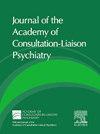Assessment of Decision-Making Capacity in 97 Hospitalized Patients With Cancer: A Call for Standardization
IF 2.7
4区 心理学
Q2 PSYCHIATRY
Journal of the Academy of Consultation-Liaison Psychiatry
Pub Date : 2024-09-01
DOI:10.1016/j.jaclp.2024.05.004
引用次数: 0
Abstract
Hospitalized patients with cancer face pivotal decisions that will affect their cancer care trajectory and quality of life, but frequently lack decision making capacity (DMC). Standardization is conspicuously missing for inpatient oncology teams and for consultation-liaison psychiatrists performing DMC assessments for patients with cancer. This study sought to characterize a single institutional experience of psychiatric consultations to assess DMC. We conducted a retrospective chart review of 97 consecutive psychiatric consultations for DMC from 2017 to 2019. Demographic, hospital-based, and psychiatry consult differences were assessed based on the reasons for DMC evaluation (uncertainty, patient refusal, and emergency) and whether patients had decisional capacity. Out of 97 consultations, 56 (59%) hospitalized patients with cancer were unable to demonstrate capacity. Consultations came from medical services almost exclusively. Only 5% of primary teams documented their own DMC evaluation. Only 22% of DMC evaluation by consultation-liaison psychiatrists documented four determinates of DMC. Few commented on reversibility or tenuousness of DMC, and the identification of agents/surrogates; however, psychiatry consultants were more likely to follow up on patients without DMC. One-third of patients died in the hospital and two-thirds of patients were deceased 3 months after the consult. Given the substantial heterogeneity in the documentation of DMC evaluations in this retrospective chart review, we call for more rigor and standardization in documentation of DMC evaluations.
评估九十七名住院癌症患者的决策能力:呼吁标准化
住院癌症患者面临着影响其癌症治疗轨迹和生活质量的关键决定,但他们往往缺乏决策能力(DMC)。住院肿瘤团队和咨询联络精神科医生在为癌症患者进行 DMC 评估时明显缺乏标准化。本研究试图描述一家机构在进行精神科会诊以评估 DMC 方面的经验。我们对 2017 年至 2019 年连续 97 次 DMC 精神科会诊进行了回顾性病历审查。根据 DMC 评估的原因(不确定性、患者拒绝和紧急情况)以及患者是否具有决策能力,评估了人口统计学、医院和精神科会诊的差异。在 97 例咨询中,56 例(59%)住院癌症患者无法证明其行为能力。会诊几乎全部来自医疗服务机构。只有 5% 的初级团队记录了自己的 DMC 评估。只有 22% 的会诊联络精神科医生在 DMC 评估中记录了 DMC 的四个决定因素。很少有人对 DMC 的可逆性或不稳定性以及代理人/替代人的识别发表评论;然而,精神科顾问更有可能对没有 DMC 的患者进行随访。三分之一的患者在住院期间死亡,三分之二的患者在会诊 3 个月后死亡。鉴于此次回顾性病历审查中对 DMC 评估的记录存在很大差异,我们呼吁对 DMC 评估的记录应更加严格和标准化。
本文章由计算机程序翻译,如有差异,请以英文原文为准。
求助全文
约1分钟内获得全文
求助全文
来源期刊

Journal of the Academy of Consultation-Liaison Psychiatry
Psychology-Clinical Psychology
CiteScore
5.80
自引率
13.00%
发文量
378
审稿时长
50 days
 求助内容:
求助内容: 应助结果提醒方式:
应助结果提醒方式:


